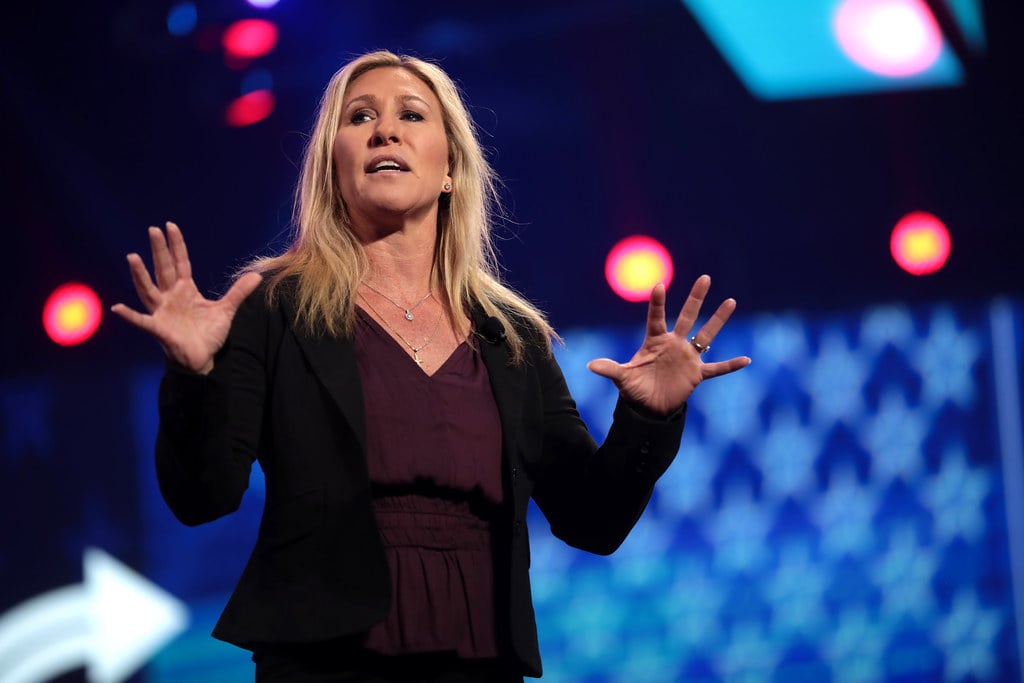Key Takeaways
• Marjorie Taylor Greene called the deaths in Gaza a genocide.
• AIPAC slammed her comments and compared her to the Squad.
• Greene accused AIPAC of breaking U.S. law by not registering under FARA.
Marjorie Taylor Greene shocked many by labeling the Gaza crisis a genocide. She said the mass deaths and starvation in Gaza are as horrific as the October 7 attack in Israel. Almost immediately, the American Israel Public Affairs Committee fired back. Now, this clash has the far-right congresswoman sparring with a powerful pro-Israel lobby group.
Why Marjorie Taylor Greene’s Gaza Remarks Triggered AIPAC
First, Greene praised the hostages’ return and called the October 7 attack horrific. Then, she added that the Israeli response in Gaza is a genocide. Second, Marjorie Taylor Greene stands out among Republicans by using that strong word. As a result, AIPAC publicly attacked her. Moreover, they accused her of spouting “vile rhetoric” and voting against the US-Israel alliance.
What AIPAC Said
After her post, AIPAC compared Marjorie Taylor Greene to Muslim members of the Squad. They said it was shocking to hear “anti-Israel smears” from Greene. They wrote that she now shares the same message and vision as Rashida Tlaib and Ilhan Omar. They added that the war continues because Hamas refuses to free hostages. Yet, they said Greene won’t pressure Hamas to stop the fighting.
Greene’s Response and FARA Accusation
In turn, Greene hit back hard. She accused AIPAC of breaking the Foreign Agents Registration Act. That law requires groups paid by foreign governments to register with the US. She asked if all the “foreign agents at AIPAC” had registered under FARA. Then, she called them liars who break the law. In her view, calling her a liar only proved their guilt.
US Policy Context
Until now, US support for Israel has stayed strong. Since October 7, most Republicans and Democrats backed aid to Israel. Even President Biden has expanded support. Yet, the Israel official sex trafficking sting in Nevada stirred controversy. Critics claimed the White House helped an arrested Israeli official leave the country. The administration denied that claim. Meanwhile, the Greene–AIPAC feud adds a new twist to the debate.
Why This Feud Matters
First, AIPAC usually has solid GOP support. Now, a far-right Republican has gone public against them. Second, Greene’s comments reflect growing frustration over civilian deaths in Gaza. People across the spectrum have called for a ceasefire. Thus, some Republicans may now question AIPAC’s influence. Finally, this clash could shift the US-Israel debate in Congress.
Reactions from Across Washington
Some Republicans defended Marjorie Taylor Greene. They praised her for speaking out about a humanitarian crisis. Others worried she hurt GOP unity on Israel. Meanwhile, Democrats saw her feud as proof that criticism of Israel can come from both sides. Observers note that civil liberties groups have long pushed for more oversight of pro-Israel lobbies. Now, Greene’s FARA claim gives that call new fuel.
Possible Outcomes
If AIPAC registers under FARA, it must disclose finances and lobbying work. That could lead to more public scrutiny of who funds pro-Israel advocacy. However, AIPAC may refuse to register, insisting they are not foreign agents. In that case, Greene could file a legal challenge. Court battles over FARA have dragged on for years, so a fight could take time.
What’s Next in the Feud
Greene says she will keep pressing the FARA issue. She plans to ask more lawmakers to join her. Meanwhile, AIPAC may ramp up its public campaign against her. They could fund ads or send letters nationwide. In any event, this feud will likely shape how future Israel aid votes play out in Congress.
Conclusion
This rare clash between Marjorie Taylor Greene and AIPAC shows how heated the Gaza debate has become. On one side, a GOP firebrand questions Israeli actions. On the other, a top lobbying group defends a long-standing US ally. As both sides dig in, the Capitol may see new fights over foreign policy and free speech. Either way, the feud highlights growing divisions over war, aid, and law.
FAQs
What does the Foreign Agents Registration Act require?
The Foreign Agents Registration Act asks lobby groups paid by foreign governments to register with the US. They must detail their funding, clients, and activities to promote transparency.
Could other Republicans join Greene’s push?
Yes. Some GOP lawmakers have raised concerns about civilian harm in Gaza. They may support Greene’s firm stance on legal oversight of lobbies.
How might this feud affect US aid to Israel?
If the feud grows, it could influence upcoming votes on aid. Lawmakers might demand conditions on funding or more debate on policy.
Will AIPAC register under FARA?
AIPAC insists it is not an agent of any foreign government. It may continue to resist registration while defending its work to support Israel.
